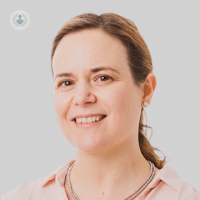Exploring healthy ageing: A personal journey
Autore:Healthy ageing is a deeply personal journey, marked by vitality, purpose, and well-being. From nutrition to medical care, its essence is woven throughout life's stages. It matters because it embodies the pursuit of fulfilment and potential. Guiding this journey are geriatric specialists, offering personalised care to navigate the path ahead. In her latest online article, Dr Maria Corretge explores the essence of healthy ageing and embraces its boundless possibilities.

What's meant by health ageing?
Healthy ageing is a deeply individualised concept, varying greatly from person to person. For me, it involves enjoying a leisurely stroll on the beach with my dog, feeling pleasantly exhausted afterward. However, someone else might define it as continuing to pursue their passion in their chosen field. Others may simply aspire to be pain-free and emotionally content. Thus, healthy ageing is subjective, often linked to activity levels and mental well-being, encompassing concerns like memory, alertness, and the avoidance of debilitating conditions such as dementia. While we cannot prevent every ailment or guarantee perpetual happiness, we can take proactive steps to mitigate suffering and improve quality of life. By establishing meaningful connections with patients and understanding their priorities, we can realistically assist them in achieving their health goals, striving to optimise well-being at any stage of life.
What are the key factors involved in health ageing?
Critical elements of healthy ageing encompass nutrition, physical activity, medication management, and the timely diagnosis of significant health conditions. While not all ailments have a cure, diagnosis remains crucial for patient understanding, family comprehension, and effective planning. Understanding one's health condition, available treatments, and potential complications allows for proactive decision-making. Healthy ageing shares common foundations with general well-being across all ages, including nurturing relationships, maintaining a balanced diet, and staying physically active. However, it also necessitates heightened awareness of neurocognitive health and overall medical well-being, which become increasingly pertinent as individuals age.
What age can people begin to think about ageing healthily?
Starting from the prenatal stage, even within the womb, a mother's diet significantly impacts an individual's future growth and development. Similarly, during childhood, the food and care provided by parents play a crucial role in shaping a child's growth trajectory. Thus, the significance of nutritional and nurturing practices persists from early stages and throughout life. It's imperative to recognise that it's never too early or too late to prioritise these factors. They should be taken seriously at every stage of life.
Why is health ageing important?
I believe it's crucial because even as individuals grow older and retire, they retain immense potential, aspirations, and valuable relationships. With age often comes a depth of wisdom and a desire to make the most of time while avoiding unnecessary suffering. Consequently, there's a heightened focus on maintaining wellness, seeking medical check-ups, and engaging in beneficial activities. While this disposition can be present at any age, it becomes especially significant for those entering later stages of life.
How can a specialist in geriatrics help?
As previously mentioned, ageing often introduces unique health challenges, including conditions that become more prevalent with time. Additionally, the medications that once suited us in our younger years may no longer be optimal, or our health priorities may have shifted. For instance, while some patients prioritise freedom from pain, others prioritise mental alertness or a medication-free lifestyle. Consequently, personalised care is essential, with geriatricians playing a crucial role in understanding each patient's individual needs and health dimensions. This involves evaluating undiagnosed conditions, optimising disease management, and addressing concerns that may impact their well-being and relationships. Together, a geriatrician and patient can formulate a comprehensive plan for the future, ensuring optimal health and quality of life.
Dr Maria Corretge is an esteemed geriatrician and general physician. You can schedule an appointment with Dr Corretge on her Top Doctors profile.


